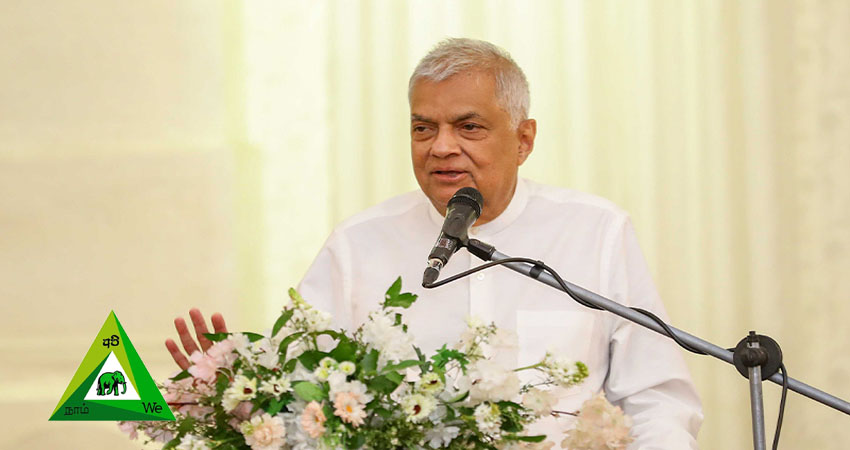Realigning the Political Party System to Serve the Nation’s Needs

- National Interests can’t be met by focusing on party agendas.
- By doing so country had to face a grave crisis.
- Join hands to take the country forward by prioritizing law and order – President’s Directive to lawyers in the Anuradhapura District.
President Ranil Wickremesinghe emphasized the necessity of evolving the political party system in our nation to prioritize economic advancement over partisan interests. Stressing the detrimental consequences of tailoring the country’s economy to suit party agendas, he underscored the imperative of breaking away from conventional political practices to avert future crises.
Speaking at a meeting with lawyers from the Anuradhapura district (06), President Ranil Wickremesinghe reflected on recent events that have shaken the foundations of democracy in the country. He urged the legal fraternity to unite in upholding law and order while propelling the nation towards progress.
During the meeting, the lawyers presented various professional concerns and suggestions aimed at contributing to the government’s efforts to bolster the economy. Responding to their inputs, President Wickremesinghe addressed several of their demands concurrently and announced plans to allocate funds for the establishment of a dedicated lawyers’ lounge in Anuradhapura, thereby enhancing the professional stature of local legal practitioners.
Further expressing his views President Ranil Wickremesinghe said;
“Here, among us, are individuals representing various political affiliations. However, I stand before you not solely as the leader of the United National Party but as your President, committed to serving all citizens.
The era of traditional thinking has drawn to a close, and it is imperative that we break free from the constraints of conventional politics, which have led us into the challenging circumstances we now face.
The party system must adapt to serve the interests of the nation, recognizing that the country’s development cannot be subject to the whims of political parties.
Our history bears witness to the myriad challenges arising from such practices, with accountability often lacking, leaving us in a state of political impasse.
I advocate for a collaborative approach among major political entities to address these issues. While our nation’s foundation was laid by established parties like the United National Party and the Sri Lanka Freedom Party, the landscape has evolved with the emergence of numerous new parties. The dynamics may shift further in upcoming elections, underscoring the need to prioritize national interests over partisan agendas to prevent further division.
Recent events, including the tragic loss of one of our MPs, serve as stark reminders of the consequences of political discord. We must ask ourselves if we are willing to regress to such turmoil. It is disheartening that some politicians have condoned such violence, and even institutions like the Bar Association, entrusted with safeguarding human rights, have failed to condemn these actions.
On that fateful day, a democratically elected Member of Parliament lost his life, prompting us to question the state of democracy in our nation. The fundamental principle dictates that the leader commanding the majority in parliament should rightfully assume the role of Prime Minister. Yet, when we witness incidents like the attempted burning of the Prime Minister’s residence and calls for resignation from the opposition, we must ponder if true democracy prevails.
Imagine such scenarios unfolding in a country like England; it underscores the urgent need to fortify democratic principles within our borders. In adherence to these principles, any party inciting unrest should be unequivocally condemned. Mr. Kumara Welgama, despite being in the opposition, demonstrated valour by rescuing individuals from a perilous situation. He is neither a criminal nor a malefactor.
Our collective responsibility lies in establishing and upholding law and order. While parties may pledge to combat corruption, it is the judiciary’s role to prosecute wrongdoers. Embracing modern political practices is essential to combatting out-dated norms. The recent turmoil shook the foundations of our democracy, compelling us to collectively steer the nation towards progress.
I extend an invitation to all citizens to rally behind the cause of safeguarding democracy and propelling our country towards a brighter future.”
The President also responded to questions posed by some of the lawyers;
Issue: Proposing a formal plan to develop Anuradhapura as a tourist destination to foster its expansion.
Response by the President: We’re addressing land-related challenges by consolidating government land ownership under a single institution. This initiative aims to facilitate the province’s development through a structured plan. Notably, several prominent tourist hotels have shown interest in investment opportunities here, which we’re keen to encourage. Consequently, Anuradhapura is undergoing systematic development as a tourist hub.
Issue: Amidst economic turmoil, addressing wastage in government institutions and exploring revenue-generating avenues is crucial. Inquiring about potential reforms in procurement and operations of entities incurring substantial losses.
President’s response: Efforts are underway to curb wastage within government bodies, with parliamentary committees tasked to investigate and propose solutions. Additionally, we’re contemplating reducing the number of government departments and corporations through expert consultations. The existing bureaucratic setup, often redundant, necessitates structural reforms. Future plans involve devolving responsibilities to provincial councils and prioritizing economic revitalization.
Collaboration with international entities like the World Bank and the Asian Development Bank is underway, drawing inspiration from England’s post-1979 reorganization.
Among those present were Minister Manusha Nanayakkara, State Minister Shehan Semasinghe, Member of Parliament Duminda Dissanayake, former Minister P. Harrison, United National Party Secretary General, former Minister Palitha Ranga Bandara, President Director General (Community Affairs) Rajitha Keerthi Thennakoon, President Trade Unions Director General Saman Ratnapriya, former opposition leader of the North Central Province, Attorney Kasturi Anuradhanayake, and members of the Anuradhapura Bar Association.





